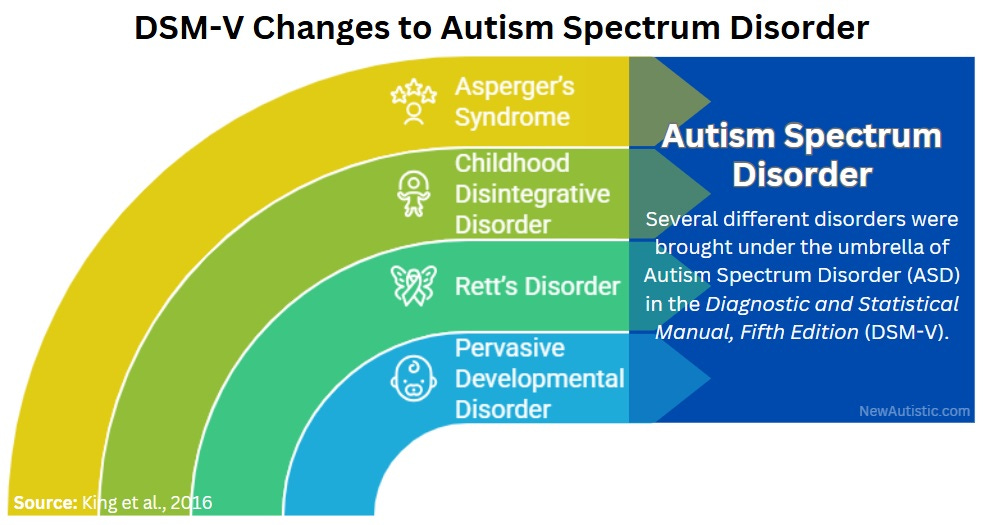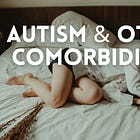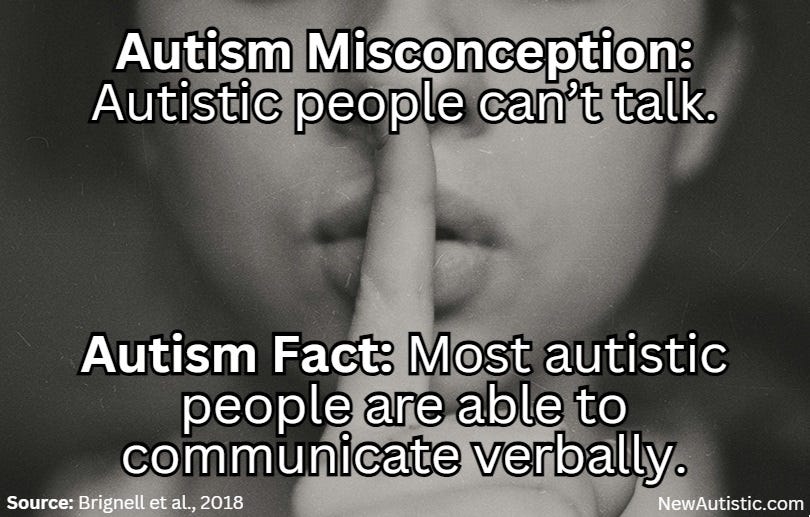Misconceptions About Autism
Debunking Autism Myths: Separating Fact from Fiction
It is impossible for autistic people to make eye contact? Can people with autism understand sarcasm? There are a lot of myths and misconceptions about autism out there, many of which I will discuss in this article. I'd also like to remind everyone that when you've met one autistic person, you've met one autistic person. Every autistic person is different, and this site is based off of my research, observations, and opinions. As always, I encourage everyone to do their own research and come to their own conclusions.
Terms to Know
In order to fully understand this article, having a basic knowledge of some common terms is helpful.
DSM-V: The Diagnostic and Statistical Manual of Mental Disorders, Fifth Edition, which is the taxonomic and diagnostic manual published by the American Psychiatric Association.
Neurotypicals: People who are not on the spectrum (those who do not have autism, ADHD, and/or another disorder).
Neurodivergents: People who are on the spectrum (those who have autism, ADHD, and/or another disorder).
Now, let’s take a look at some common misconceptions…
Misconception: Autistic people can't make eye contact.
Although not being able to make eye contact is a common (and often well-deserved) stereotype of autism, many autistic people are able to do it well. Through masking and camouflaging, many of us are able to seem pretty neurotypical, although it can make us feel uncomfortable to do so. Additionally, for many of us, we actually listen better and are able to pay more attention when we aren't looking at someone in the eyes, which is part of the reason many of us look away. It's not to be rude; it's actually to try to listen to you better!
Misconception: You have to be intellectually disabled to have autism.
The DSM-V's diagnostic criteria for autism does not include intellectual disability for a diagnosis of autism spectrum disorder (ASD). This is probably a misconception because intellectual disability is common comorbidity when it comes to ASD, although it is not necessary for a diagnosis. Additionally, those with obvious intellectual disabilities are probably more likely to be taken in for an autism assessment and diagnosis compared to those autistic people without intellectual disabilities, so it's sort of a self-perpetuating stereotype in that way.
Misconception: There is an autism epidemic and it's spreading.
I discuss this topic in far more detail in my article Why is Everyone Autistic Now, but the truth of the matter is that there isn't a lot of evidence that suggests rates of autism itself are on the rise. It seems more likely that people who previously went undiagnosed are now getting diagnosed, so the rates of people diagnosed with autism are indeed going up. That doesn't necessarily mean that more people are autistic -- only that more people are getting diagnosed now that they know the signs and symptoms to look for, especially since both the diagnostic criteria and ASD itself were overhauled in 2013.
That being said, it's also possible that rates of autism itself are going up (if more neurodivergent people are producing neurodivergent offspring), but certainly not at the exponential rates that the autism diagnoses are going up... unless there's some super-autism breeding facility somewhere. Someone in the know needs to fill me in!
Misconception: Autistic people don't have empathy.
Another common misconception is that autistic people don't have empathy. While it's true that some autistics seem almost devoid of empathy, there are plenty of us who are extremely empathic: "Some autistic individuals show typical cognitive empathy and some even report an excess of emotional empathy." It really depends on the person!
I will also say that I believe this stereotype is so prominent because a lot of autistic people also have alexithymia, a condition in which people have trouble identifying, describing, and expressing feelings in both themselves and others. Those with alexithymia may seem to have less empathy because they have a hard time processing their own emotions, thereby perpetuating the stereotype that autistic people are unempathetic.
Misconception: Autistic people don't have a sense of humor and can't understand sarcasm.
Ah, I see you haven't perused this website enough if you still believe this particular misconception. I think it largely stems from a time before the DSM-V came out and it was believed that autistic people were too stupid to understand any subtleties, but don't worry, because I'm here to let you know that autistic people absolutely can have senses of humor as well as a good understanding of sarcasm and facetiousness.
While it's true that we may have a harder time picking up on certain subtle social cues, that doesn't mean that we can't understand them when we are aware of them. There are even plenty of autistic stand-up comedians like Dan LaMorte, AJ Wilkerson, Joe Wells, and Fern Brady, so this misconception is quite outdated.
Misconception: Autistic people can't talk.
While there can be some overlap between autism and selective mutism or even mutism in general, it would be a real stretch to suggest that all autistic people are either bad at talking, don't like to talk, or can't talk. Of course, there are autistic people who can't or won't talk often, but most of us are able to talk, especially about our special interests. (This website is a perfect case in point.) In fact, I'd wager that some people wish we'd shut up once in a while.
Misconception: Vaccines cause autism.
I've intentionally not delved into this topic too much because of the explosive political rhetoric surrounding it, but I will state here that there is currently no viable evidence that points to the idea that vaccines cause autism. I may do a more in-depth article about this whole debacle at some point, though I will give a brief overview of it below.
The one study that purportedly found a "link" between the measles, mumps, and rubella (MMR) vaccine and autism has been not only debunked but also retracted. Its primary author, Andrew Wakefield, failed to disclose a conflict of interest for the study's funding: "Wakefield had been funded by lawyers who had been engaged by parents in lawsuits against vaccine-producing companies." How convenient!
On top of that, data from Wakefield's study was also found not only to be inaccurate but also falsified and fraudulent. Some have even described Wakefield's study as "one of the most serious frauds in medical history."
But, if you're still not convinced, it's probably worth looking at the more nitty gritty of Wakefield's original study. He and his co-authors (of which all but two subsequently retracted their support of) used a group of 12 children to test their theory that the MMR vaccine might cause autism and purportedly found a link between the two. Again, this study was funded by lawyers looking to pursue lawsuits.
To confirm or deny his findings, subsequent studies have been conducted (as is the norm in the scientific community), including one in 2015 that studied over 95,000 children and how the MMR vaccine might impact rates of autism. The results of that study showed that "the MMR vaccine was not associated with increased risk of [autism spectrum disorder]." Another study examining over 1,000 children also found that exposure to vaccine antibodies do not increase risk for the development of autism.
Now, I'm not a mathematician by any stretch of the imagination, but I'd be more willing to accept the findings of a study that examined 95,000 subjects (or even 1,000 subjects) than one that only studied 12. Maybe that's just my logical autistic brain talking, though.
Misconception: Parenting styles cause autism.
This misconception stems from Bruno Bettelheim, author of the 1967 book The Empty Fortress: Infantile Autism and the Birth of the Self. Bettelheim's book suggested that the way in which people, mothers especially, parented their children resulted in the development of autism — a theory known as psychogenesis. This theory was examined and then largely discredited.
One obvious issue with Bettelheim's theory is that there are plenty of families in which one sibling is autistic and another is not. If the way in which both children were parented caused autism, why did only one sibling end up with the disorder?
Eventually, Bettelheim was accused of physically abusing the special needs children he'd worked with, and his professional accolades were also called into question, leading to his reputation being rather tarnished. Most scientists today do not believe that parenting styles can or do lead to the development of autism spectrum disorder, and there's no evidence to support this theory.
Misconception: We need a cure for autism.
This is another topic that I've somewhat avoided just because of how heated people can become about it. I think I can see this argument from both sides, but I'm also sure that some people will disagree with me, which is also fine.
For people like me where I am largely able to care for myself and function in society despite my autism, I wouldn't say I need a cure. If I weren't autistic, I certainly wouldn't be writing this now. My autism is part of what makes me me. Yes, there are drawbacks to being autistic, but there are a lot of good things about it, too.
Did you know that autistic people can be from 90 to 140 percent more productive than their neurotypical peers? And one study discussed in Harvard Business Review found that neurodiverse teams in organizations are 30 percent more productive than others.
That being said, I can see why parents and loved ones of those with so-called "profound autism" (in which someone is disabled to the point where they are unable to care for themselves) would want a cure. Indeed, "mental retardation" is a common comorbidity of autism, with about half of autistic children meeting the criteria for "mental retardation." No one wants to be a burden on their family, friends, and loved ones, and if there were a cure that could help those with profound autism function in society better, I am sure there are plenty of people who would support that.
Misconception: Every autistic person is either a savant or an imbecile.
Just like the wide range of intelligence levels one finds in neurotypical people, there is a similar spectrum when it comes to autistic people. Studies have found that "nearly half of individuals with [autism spectrum disorder] have average or higher IQ." So, some autistic people have very low levels of intelligence, especially when it comes to those with "profound autism" or "mental retardation." Other autistic people are considered geniuses and revolutionary thinkers, like Temple Grandin. Additionally, there is a whole swathe of autistic people who fall somewhere between the two extremes, so to say that every autistic person is either a savant or an imbecile would be incorrect.
Summarizing the Misconception Corrections
From the aforementioned misconception discussion, it’s clear that there are many misconceptions surrounding autism, and these myths can often lead to misunderstanding and stigma. However, as I’ve illustrated above, autism is a highly individual experience, and no two autistic people are the same. It’s important that we move beyond outdated stereotypes and embrace a more nuanced understanding of neurodiversity. Whether it’s about eye contact, empathy, or humor, it’s vital to remember that every autistic person brings something unique to the table.
Thanks for Reading!
Thanks for taking time out of your busy day to spend some time with me! I encourage all of my readers to RISE (Reflect, Improve, Strengthen, & Evolve) with me because healing is a lifelong journey — it’s not always easy, but it’s always worth it. You are loved, cherished, and valued. Don’t ever let anyone ever convince you otherwise.
My commitment to bringing you FREE, well-researched, and comprehensive content means I spend considerable time and effort writing each article or post without compensation.
Want to Support Me?
The simplest FREE way you can support me is by subscribing, sharing, or leaving a comment:
I believe in keeping my content accessible to everyone, without paywalls, because I know the work I do matters. For that reason, I’m beyond grateful for any financial support! If you'd like to support me and my work, check out my art website at AriesArtwork.com to bring home something unique or find a gift for that special someone in your life:
I’ll see you again when I’ve got a new info-dump for you, my Newtistics Crew!
—Skylar Aries









